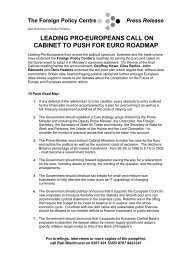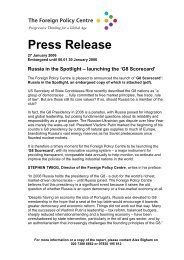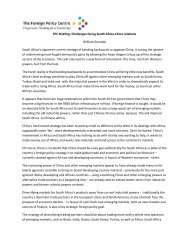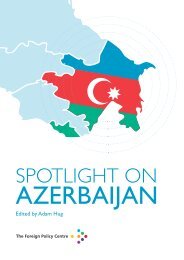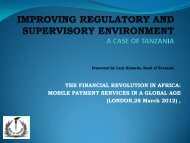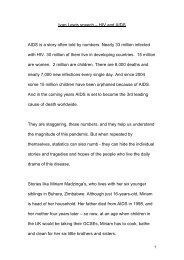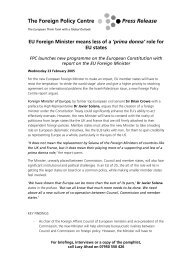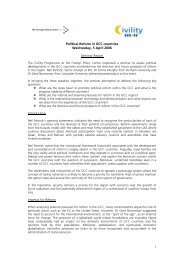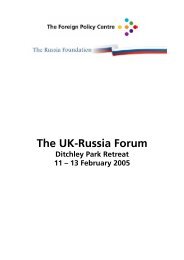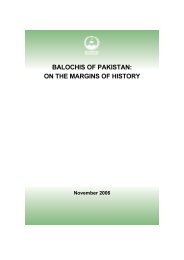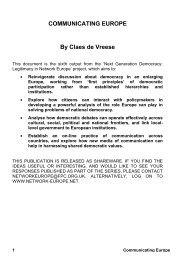The Political Fortunes of War - Foreign Policy Centre
The Political Fortunes of War - Foreign Policy Centre
The Political Fortunes of War - Foreign Policy Centre
You also want an ePaper? Increase the reach of your titles
YUMPU automatically turns print PDFs into web optimized ePapers that Google loves.
<strong>The</strong> <strong>Political</strong> <strong>Fortunes</strong> <strong>of</strong> <strong>War</strong><br />
been recorded. 14 A third phase <strong>of</strong> the Bush Presidency began with the war<br />
against Iraq, when his slowly declining approval from September 11 th<br />
surged once again after the war began (although not to the levels <strong>of</strong> fall<br />
2001). After the end <strong>of</strong> major hostilities on May 1, 2003, approval began a<br />
long decline to the 47 percent level cited immediately above.<br />
How much <strong>of</strong> the decline in this latest, post-Iraq war phase is due to the<br />
unpopularity <strong>of</strong> the war and occupation, and in particular to the casualties<br />
that have been suffered? To answer this question, we first divided the Bush<br />
presidency into two parts: the first including the period before the<br />
commencement <strong>of</strong> the war in Iraq, and the second including the period<br />
since the commencement <strong>of</strong> the war on March 19, 2003.<br />
Following the literature on the correlates <strong>of</strong> presidential approval, for each<br />
<strong>of</strong> these two phases we estimate the impact <strong>of</strong> economic conditions, “rally<br />
events”, and the casualties <strong>of</strong> war (for the Iraq war period only). 15<br />
Economic conditions are represented in the estimates by the year-on-year<br />
percentage change in real disposable income per capita. This measure has<br />
proven to be a powerful influence on electoral prospects in previous studies<br />
and for this reason should also have a strong influence on presidential<br />
approval. 16 <strong>The</strong> impact <strong>of</strong> potential rally events is indexed by the amount<br />
<strong>of</strong> coverage <strong>of</strong> the event in the New York Times. 17 Iraq war casualties are<br />
as reported by the US central command.<br />
14<br />
Hetherington and Nelson, “Anatomy <strong>of</strong> a Rally Effect”.<br />
15<br />
Our approach closely resembles the procedures employed in the scholarly studies cited in<br />
footnote 13 above.<br />
16<br />
We are aware that there are alternative measures <strong>of</strong> economic performance, such as the<br />
index <strong>of</strong> economic performance employed by Erikson, Mackuen, and Stimson, Macro Polity,<br />
p. 44, or the cumulative growth in leading economic indicators employed by Christoper<br />
Wlezien and Robert S. Erikson, “<strong>The</strong> Fundamentals, the Polls, and the Presidential Vote,” PS:<br />
<strong>Political</strong> Science and Politics, (July 2004), forthcoming. We intend to evaluate these<br />
alternatives in future versions <strong>of</strong> this report. On the statistical power <strong>of</strong> disposal income, see<br />
Bartels and Zaller, “Presidential Vote Models”; Hibbs, “Bread and Peace Voting”; and Ray<br />
Fair, “<strong>The</strong> Effect <strong>of</strong> Economic Events on Votes for President: 1984 Update,” <strong>Political</strong><br />
Behavior, 10 (1988), 168-179.<br />
17<br />
<strong>The</strong> rally index for the event was based on the extent <strong>of</strong> coverage <strong>of</strong> the event on the New<br />
York Times (NYT) website. Word counts <strong>of</strong> all stories referring to the event were totalled for<br />
the day after the event, and every seventh day thereafter. <strong>The</strong> rally was considered over when<br />
the word count dropped below 20 percent <strong>of</strong> the maximum word count. To facilitate<br />
interpretation, word counts for a rally event were divided by the maximum word count.<br />
11<br />
<strong>The</strong> <strong>Political</strong> <strong>Fortunes</strong> <strong>of</strong> <strong>War</strong><br />
<strong>The</strong> results are shown in Table 3. Turning first to the estimates for the first<br />
period (prior to the Iraq war), we find a surprise: economic performance, as<br />
measured by the change in disposal income, had no impact on presidential<br />
approval between January 2001 and March 2003. Perhaps our measure <strong>of</strong><br />
economic performance is a poor one, but we find this explanation<br />
implausible given the demonstrated political importance <strong>of</strong> disposal income<br />
in a substantial body <strong>of</strong> previous scholarly research. More likely is the<br />
possibility that, beginning with September 11, the Bush Presidency<br />
essentially became a “war” presidency, with evaluations <strong>of</strong> the President<br />
dominated by a preoccupation with his handling <strong>of</strong> terrorism and war. 18 We<br />
should also recall that the economy and the President’s ratings ran in<br />
opposite directions following September 11, as the economy turned sour<br />
even as the President’s popularity soared. Finally, during 2001, it may be<br />
that voters did not hold Bush accountable for a recession that would have<br />
likely occurred regardless <strong>of</strong> who occupied the <strong>of</strong>fice. 19 In any event, we<br />
see in Table 3 that <strong>of</strong> the many rally events that we evaluated, only the<br />
attacks <strong>of</strong> September 11 and the speech by Secretary Powell to the United<br />
Nations Security Council in February, 2003 had an impact on presidential<br />
approval, and the latter effect was minor in percentage terms.<br />
<strong>The</strong> results for the Iraq war period are shown in Table 4. Once again<br />
disposal income shows no significant impact, presumably for the reasons<br />
discussed above. For much <strong>of</strong> the period when the economy showed signs<br />
<strong>of</strong> improving, Bush’s popularity was declining as the occupation dragged<br />
on rather unsuccessfully. Especially during the first quarter <strong>of</strong> 2004, when<br />
economic indicators began showing real positive movement, dissatisfaction<br />
with the occupation was pushing Bush’s popularity downward. Further,<br />
18 As Mueller notes, it is historically unusual for Americans to name a foreign policy problem<br />
as the nation’s most pressing concern, but the period between September 11, 2001 and the Iraq<br />
war and occupation is in fact one <strong>of</strong> those periods. Between September 11 th and the Iraq war,<br />
a higher percentage <strong>of</strong> Americans <strong>of</strong>ten listed foreign policy concerns as more important than<br />
domestic ones, and the percentage was higher than at any time since 1979 (Iran hostage<br />
situation). As noted immediately below, the economy became more important to the public<br />
through March 2003, but the pattern was reversed in April 2004 when Iraq once again jumped<br />
to the top <strong>of</strong> the list. See John Mueller, “American Public Opinion and Military Ventures<br />
Abroad: Attention, Evaluation, Involvement, Politics, and the <strong>War</strong>s <strong>of</strong> the Bushes,” paper<br />
delivered to the Annual Meeting <strong>of</strong> the American <strong>Political</strong> Science Association, Philadelphia,<br />
August 28-31, 2003. <strong>The</strong> “most important problem” figures are from the Gallup Poll, as<br />
reported in the online Gallup Brain.<br />
19 We are grateful to James Stimson for calling this explanation to our attention.<br />
12



